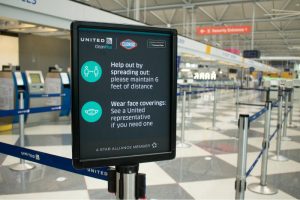As the COVID-19 pandemic continues to change the way many services operate, air travel is no exception. A common concern among travelers is airplane safety and cleanliness. Being practically shoulder to shoulder with fellow passengers for hours on end during a global pandemic certainly puts individuals at risk. With these new risk factors and concerns, airlines all over the world have adopted new safety measures to ensure their passengers can travel with a little more ease of mind.
Rigorous cleaning procedures have been implemented within the industry this year. Passengers are also required to wear masks, most airlines require this for the entirety of their time at the airport and on the flight. Airlines are maintaining social distancing procedures when possible and changing the way they serve their passengers snacks and drinks.

For instance, United Airlines has introduced their new United CleanPlus program. The program guarantees certain measures are being taken to clean and disinfect their airplanes; United had even partnered with Cleveland Clinic to receive expert advice regarding the new cleaning protocols. Like almost all airlines, the cabins are cleaned in between flights; common touch areas like seatbelts, armrests, and door handles are disinfected. As passengers board their flight, disinfecting wipes and hand sanitizer are provided. Although these items are sometimes provided, it is still strongly recommended that passengers bring their own supplies as well. While masks are already required, hand sanitizers and additional sanitizing items should be on passengers packing lists. But what about before the flight? What is being done to the planes in between passengers?
Another new protocol being taken by airlines is the use of electrostatic sprayers. These new EPA approved devices were first used by American Airlines. The SurfaceWise2 is a non-toxic cleaner that dries within minutes and will not wipe off during routine cleaning. The product kills viruses (including COVID-19) and offers weeks of protection. Airlines have now included the product into their cleaning routines in addition to regular disinfecting routines. The best part about the new device is that it can be sprayed on any surface. So airlines are using it on areas like seats, handles, and overhead compartments just to name a few. It can virtually be sprayed anywhere and will offer long term protection.
Another common measure being taken is the use of high efficiency particulate air (HEPA) filters. The filters capture microscopic particles like dust, pollen, and mold. These filters circulate the cabin air every 2-3 minutes and remove 99.97% of particles that could contain viruses and bacteria. Although the filters are efficient in removing most contaminants, it is not guaranteed to capture virus particles. Despite the fact that HEPA filters will not necessarily remove COVID-19 particles, the air in the cabin is constantly being circulated with fresh air. The HEPA filters are already an industry standard, being used by multiple airlines like Delta and JetBlue.
Ultraviolet C light wands are also being used by many airlines to continue to disinfect high touch areas like screens, switches, and the plane’s cockpit area. Ultraviolet radiation is an invisible electromagnetic radiation between 180 and 400 nanometers in wavelength. While scientists are still studying the effect UVC has on COVID-19, the technology has been used for years by doctors to protect against illnesses like SARS. Like natural UVC produced by the sun, man made UVC also shares the same sterilization properties.
What extra measures are taken in the event of COVID-19 contamination
In the event that a former passenger reports testing positive for the virus after their flight, the plan is immediately removed from service. The airplane is then put through an extensive disinfection process. The entire plane is cleaned. Floors, seats, and ceilings are wiped down.
Before travel, it is best to pack plenty of hand sanitizer, gloves, masks, and wipes. There are multiple options when it comes to purchasing these items. A convenient option is to simply purchase a kit online. Services like Lifebox provide kits that include all of the travel necessities as well as bulk options for sanitizers and face masks.
As the COVID-19 pandemic is still a main concern among travelers, hopefully the promises made by airlines will encourage those to resume -or continue their travels. Airlines are truly going the extra mile to ensure the safety of their passengers. From state-of-the-art sprayers to Ultraviolet cleaning technology, travelers can rest assured their safety is top priority. Despite these new procedures, it is still best that passengers boarded their flight prepared.
